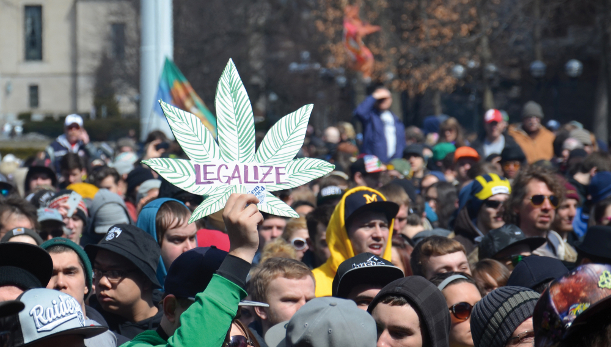The time has come for Italians to turn their backs on the failed drug war
Istituzioni ed economia

I'm an American, with no right to tell Italians what to do, but let me offer a blunt opinion: the time has come for Italians to turn their backs on the failed drug war both within Italy and around the world.
We know who most benefits from the illegality of cannabis and other drugs. It's the mafias and other gangsters who corrupt and terrorize both government officials and ordinary citizens, earning great fortunes from a global black market estimated at $300 billion per year. Prisons worldwide are filled not with drug lords but mostly poor people caught possessing, transporting or selling small amounts of drugs. Police and military are drawn into an unwinnable war that violates basic rights, and ordinary citizens just hope they don’t get caught in the crossfire. And meanwhile more people are using more drugs than ever. It’s my country’s history of alcohol Prohibition and Al Capone – times fifty!
No logical reason exists to persist with this failed and costly policy. That's the opinion of the Global Commission on Drug Policy, whose members include many distinguished former presidents from Latin America and Europe as well as former UN Secretary General Kofi Annan, the entrepreneur Richard Branson and two of the United States' most distinguished statesmen, former Secretary of State George Shultz and former chairman of our Federal Reserve Bank, Paul Volcker. It's the conclusion recently reached by Italy's National Anti-Mafia Directorate. And it's also the consensus among scientists and scholars who have studied the issue most deeply.
The markets in marijuana, cocaine, heroin and methamphetamine are global commodities markets, just like the global markets in alcohol, tobacco, coffee, tea and so many other things. If one source is eliminated, another quickly emerges. Where there’s a demand, there will be a supply. People tend to think of a prohibition as the ultimate form of regulation when in fact it’s the abdication of regulation, with criminals filling the void.
That’s why putting police and security agencies front and center in trying to control a dynamic global commodities market is a recipe for disaster.
What we really need to do is bring the underground drug markets as much as possible above ground, and regulate them as intelligently as we can – to minimize both the harms of drugs and the harms of government policies.
With marijuana, that obviously means legalizing, taxing and regulating it. The benefits of ending this particular prohibition are enormous – and the risks minimal. Will more people use marijuana? Maybe – but not teenagers, since it’s not going to be legalized for them and they’ve always had the best access to it anyway. I think it will be older people who find they prefer a little marijuana to that drink in the evening, or to the sleeping pill, or who find it helps with their arthritis, or diabetes, or even helps spice up a long term marriage … And is that going to present a public health problem? Or perhaps a net benefit, given what we know of marijuana’s relative safety.
That's why the U.S. states of Colorado, Washington, Oregon and Alaska -- and the country of Uruguay -- are beginning to legally regulate cannabis like alcohol, and why other states and countries are sure to follow. Serious discussions are underway now in Spain, Switzerland, Denmark and the Czech Republic regarding different ways of legally regulating local cannabis markets. What are Italians waiting for?
As for the other drugs, both Italy and the United States can benefit from examining alternative drug policies outside our borders. Look at Portugal, where no one gets arrested for possessing drugs and the government is serious about treating addiction as a health issue – or at Switzerland, Germany, the Netherlands, Denmark, Britain and Canada, all of which allow people who are addicted to heroin, and who have repeatedly tried to quit and failed, to obtain legal, pharmaceutical heroin from medical clinics. The results are conclusive: illegal drug abuse, overdoses, crime and arrests all drop, health and wellbeing improve, taxpayers benefit, and many drug users even succeed in putting their addiction behind them!
Look at New Zealand, which recently enacted (although has yet to implement) a law to allow recreational drugs to be sold legally provided their safety has been established. Look at Brazil, and other countries too, where a remarkable psychedelic substance, ayahuasca, can be legally bought and used provided it’s consumed within a religious context. Look at Bolivia and Peru, where all sorts of products made with coca leaf – the source of cocaine – are available legally over the counter, with no apparent harms to people’s health. Don’t forget, Coca Cola had cocaine in it until 1900, yet so far as we know it was no more addictive than Coca Cola with caffeine is today.
Drug laws urgently need to be repealed and reformed. Only Italy's legislators can do that. The key question is: who will provide the leadership that is so urgently needed?
- Ethan Nadelmann is the founder and executive director of the Drug Policy Alliance.








